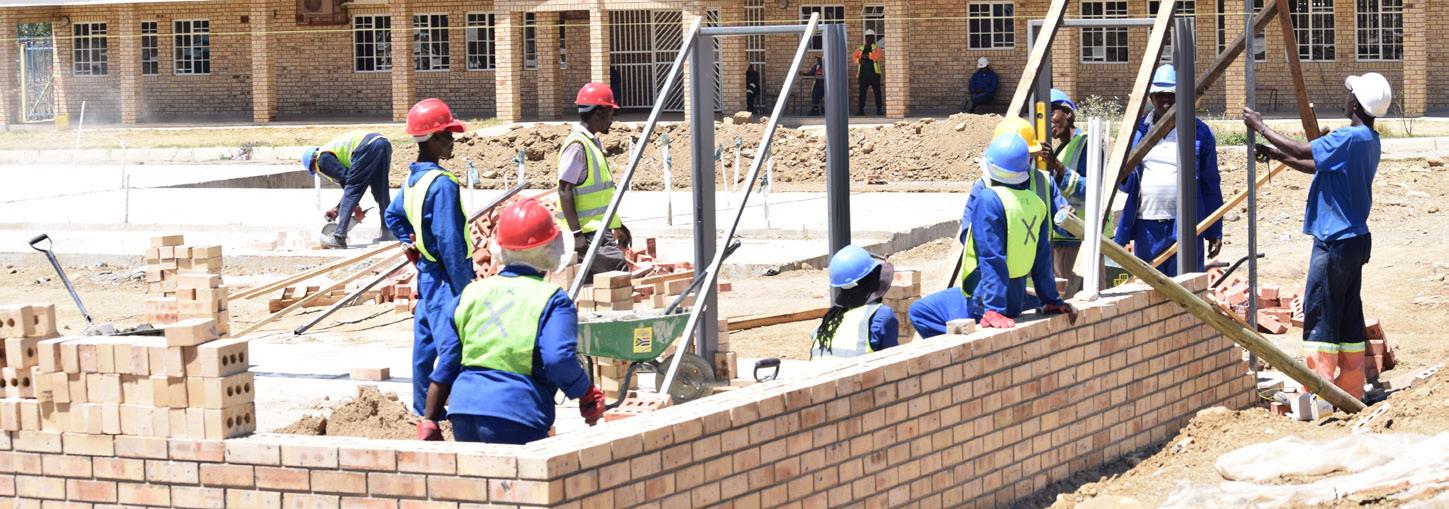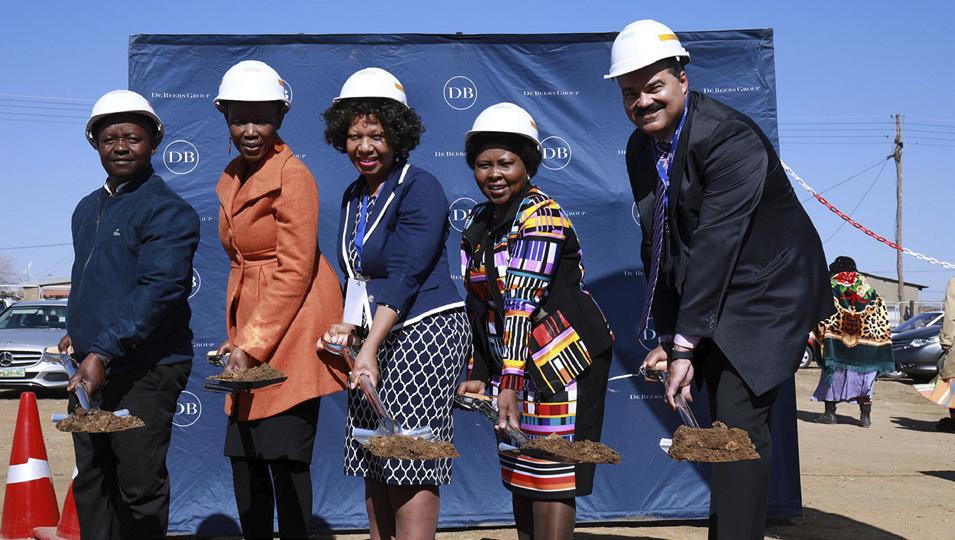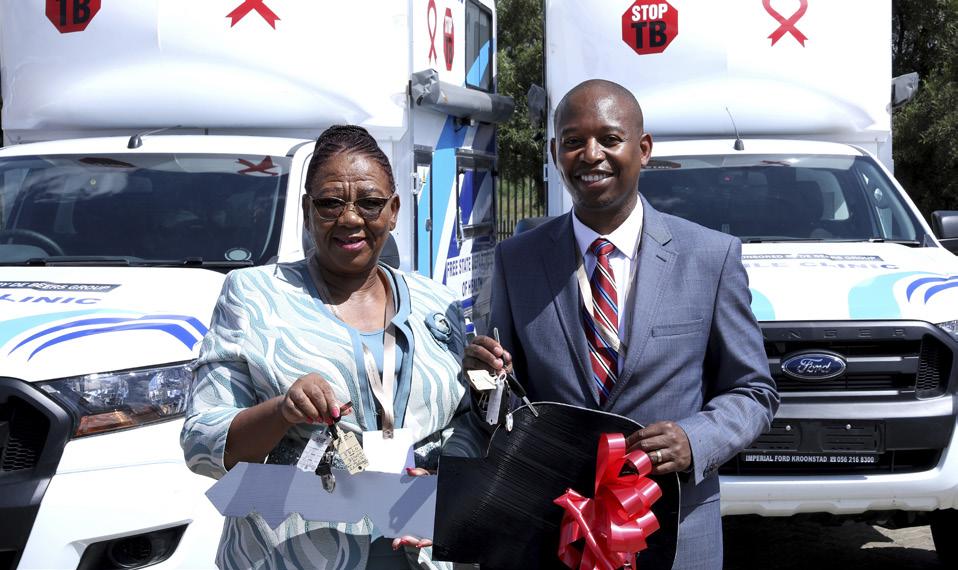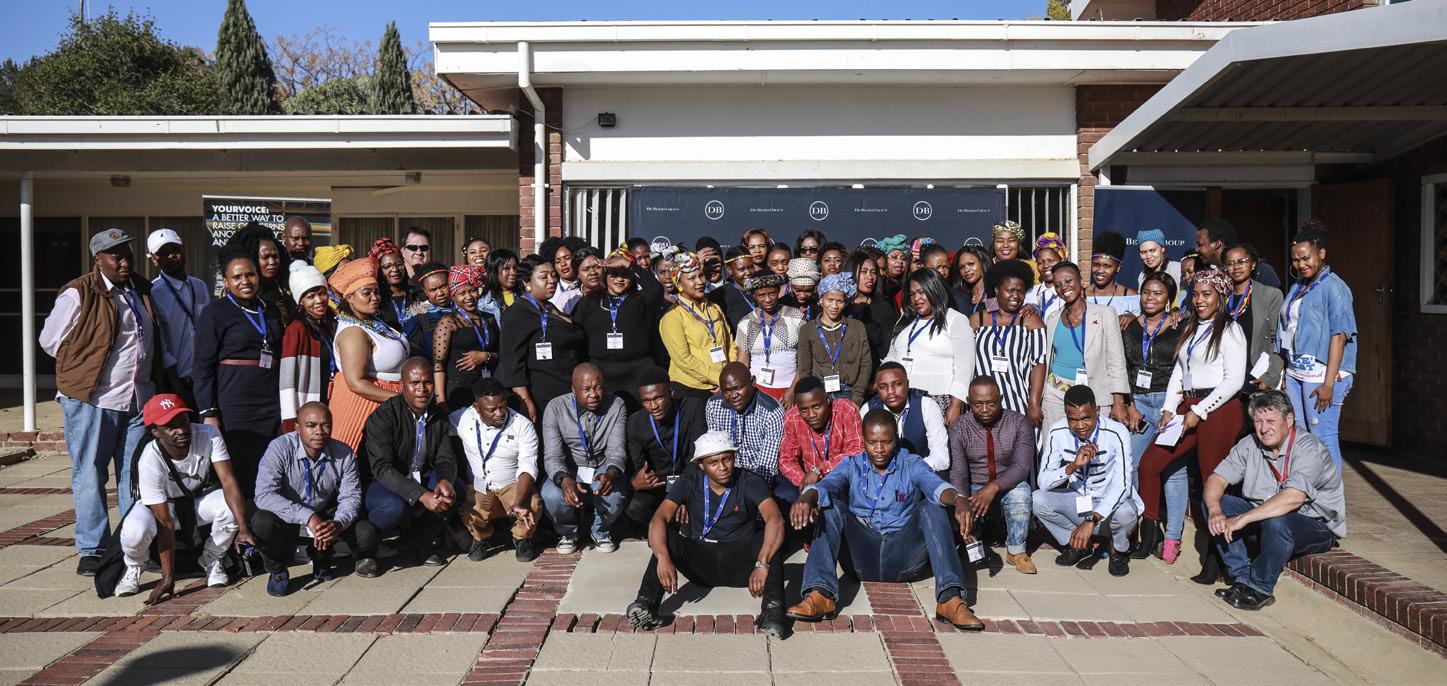
12 minute read
Mining
Gold mines are changing hands.
TThe golden triangle where the Free State, Gauteng and North West provinces meet is the site of many gold mines, several of which have changed hands or are for sale.
Advertisement
Moab Khotsong, which is in the Free State, was purchased from AngloGold Ashanti by Harmony Gold and the decision has been justified by production volumes. Harmony is now considering adding another AngloGold asset to its portfolio, the ultra-deep Mponeng mine.
Sibanye-Stillwater is the other potential buyer although that company’s focus seems to be more firmly on the platinum sector. Sibanye Gold came into existence as a result of the unbundling of Gold Fields but it has now been rebranded as Sibanye Stillwater because of the purchase of a platinum and palladium mine in the US of that name. The company is responsible for the Beatrix mine in the Free State but most of its gold assets are in Gauteng.
AngloGold Ashanti has sold most of its Vaal River Complex mines to Harmony Gold Mining for $300-million. Most of the mines are in the North West Province, but Great Noligwa and Kopanang mines are in the Free State. The complex includes one uranium plant, four gold plants and one sulphuric acid plant.
These assets increased Harmony’s underground resource base in South Africa by nearly 40%. Most of Harmony’s operations, including a tailings treatment plant, are in the Free State. The other mines are Tshipong and Phakisa (near Odendaalsrus), Virginia, Target (near Allanridge), Masimong (Riebeeckstad), Joel (near Theunissen) and Bambanani at Welkom. Phakisa has mineral reserves of just over fivemillion ounces of gold and Harmony has invested heavily in the project.
The other buyer from AngloGold Ashanti was Heaven-Sent. The Chinese company, which controls the Tau Lekoa mine through Village Main Reef, bought the Kopanang mine and associated assets for R100-million. Another Chinese company, Taung Gold, runs the Jeanette mine near Welkom.
Gold mines in the Free State also supply a substantial portion of the total silver produced in the country, and large concentrations of uranium occurring in the gold-bearing conglomerates of the goldfields are extracted as a by-product.
The mining sector makes up 11% of provincial GDP. A minerals beneficiation strategy has been developed because this is a key area for potential growth.
SECTOR INSIGHT
A minerals beneficiation strategy has been developed.
Diamonds
Petra Diamonds’ Koffiefontein mine is on the western edge of the province, about 80km from
Kimberley. The mine is regarded as a low-grade deposit, but the diamonds produced are of high value. White stones of excellent quality are produced, and fancy pink diamond are sometimes found.
The company’s expansion plan led to increased production in the 2018 financial year of 52 537 carats, up from 51 173 carats in 2017. Expansion will increase, and the plan is to mine at Koffiefontein until 2031. Petra has seven mines in South Africa. The Star mine, in which Petra is in partnership with Sedibeng Mining, is the other Free State asset.
The Voorspoed mine of De Beers Consolidated Mines closed in 2018. The National Department of Mineral Resources is trying to find a buyer for the mine, but De Beers has already run a bidding process and found no suitable buyer. The company has started the complicated business of closing down the mine, which includes offering training programmes for employees for possible future employment in other industries. It also continued to get involved in corporate social investment projects such as rural school building and the construction of an old-age home.
The Lace mine near Kroonstad went into business rescue in November 2016 after heavy rains affected operations. In May 2017 owner DiamondCorp put its listed holding company into administration. The primary lender was the Industrial Development Corporation (IDC).
Diamonds, coal and gold are the three main minerals found in the Free State, but the decline of gold mining is a cause for concern. Several summits and a Mining Indaba have focussed on what kind of economic activity can replace gold mining.
In 2016 De Beers, the South African government and the South African diamond-cutting industry launched a project to encourage diamond beneficiators. Among the first companies involved are Thoko’s Diamonds, African Diamonds, Nungu Diamonds and Kwame Diamonds. In 2017 some of the newly qualified cutters and polishers attended the Hong Kong Show.
Coal
Coal is mostly found in the northern part of the Free State and the goldfields, which form part of the Witwatersrand Basin, stretch from north of Welkom to south of Virginia.
The Sigma-Mookraal mine is run by Sasol Mining and has the capacity to supply Sasol Infrachem in Sasolburg with two-million tons of coal per year.
Seriti Resources has purchased the New Vaal Colliery from Anglo American. Together with two other mines in Mpumalanga Province, Seriti paid R2.3-billion. New Vaal is in the middle of a triangle of three towns that play an important part in industrial production: Vereeniging, Sasolburg and Vanderbijlpark. The mine employs more than 900 people and supplies about 15-million metric tons of coal to Eskom’s Lethabo power station annually.
ONLINE RESOURCES
Council for Geoscience: www.geoscience.org.za Geological Society of South Africa: www.gssa.org.za Minerals Council South Africa: www.mineralscouncil.org.za Mining Qualifications Authority: www.mqa.org.za National Department of Mineral Resources: www.dmr.gov.za South African Mining Development Association: www.samda.co.za
FOCUS School revamp boosts community
De Beers Group, the Free State Education Department and the Kagiso Shanduka Trust are partners in a multi-million-rand development.

The construction of Phuleng Primary School is underway in Maokeng, Kroonstad.
De Beers Group has partnered with the Free State Department of Education and the Kagiso Shanduka Trust (KST) to unveil the construction of a R27-million school in its labour sending area community of Maokeng in Kroonstad.
The construction of Phuleng Primary School falls under De Beers Voorspoed Mine’s Rural School Development Programme, which aims to address infrastructure needs for local schools, leave a legacy for communities and develop a working partnership with the Department of Education.
Through this partnership, the De Beers Fund and the Free State Department of Education contributed R17-million and R10-million respectively to the construction of the primary school set to benefit over 850 learners. The infrastructure development and overall project delivery will be managed by KST.
Phuleng Primary School was established in 1928 and forms part of Voorspoed Mine’s Social and Labour Plan under the Rural Development Programme. The feasibility studies by KST revealed large cracks throughout the structures and foundation walls, including poor water drainage.
The newly built school will comprise a Grade R and primary section, media centre, nutrition centre, covered walkway and security fencing. The primary section will boast 20 new classrooms and 17 ablution facilities which cater for learners with disabilities. The Grade R section will have three new classrooms, a play area and ablution facilities.
Free State Education MEC Dr Tate Makgoe said, “We wish to express our sincere gratitude to De Beers and KST for choosing to partner with us in delivering quality education to our children. The new state-of-the-art Phuleng Primary School will go a long way in improving learning and teaching in the school.”
De Beers has also partnered with KST and other various organisations in the District Whole School Development Programme, which has been successfully implemented in schools in the Fezile Dabi and Motheo Districts in the Free State. Currently in its fifth year, over 60 schools have benefited through the programme by receiving infrastructure projects such as new and renovated classrooms, ablution facilities, libraries, media centres, science laboratories and kitchens. Over 2 000 teachers are being supported through the curriculum development programme.
Voorspoed Mine partners with local municipality to provide a home for the elderly
The town of Parys to have a new and secure place for its senior citizens.
Voorspoed Mine has partnered with the Ngwathe Local Municipality to create a better future for the elderly by committing to build a new old- age facility for Ratang Maqheku Centre for the Aged in Parys.
Through its Building Forever strategy, De Beers Group is helping communities to access opportunities and thrive with the aim of leaving a positive and lasting legacy for mining communities to enjoy sustainable livelihoods beyond the life of its operations.
Malcom Hendrickse, Voorspoed Mine General Manager, said, “Our Building Forever approach unites and compels us to create a better future for our people, and we have continued to select partners and projects that will help maximise our positive impact as an organisation. We are proud of the positive impact that the new old-age home will have for elderly citizens for generations to come.
“While Voorspoed Mine stopped mining operations in December 2018, as it reached the end of its life, we will continue to implement our Social and Labour Plan as agreed with our local municipalities.”
Ratang Maqheku Centre currently operates from three rented backyard rooms in Tumahole, Parys. The centre caters for 30 elderly people daily, and provides food, primary healthcare services, physical exercises, as well as access to the local library to improve their literacy and writing skills.
The new 470-square-metre facility will comprise two bedrooms, sick bay, workshop area, rest area, consultation room, three offices, dining area, kitchen with a pantry and laundry room, two ablution facilities, as well as a reception and waiting area. Ratang Maqheku will also receive a brand-new 22-seater vehicle from De Beers Group to transport the elderly to and from the centre.
Speaking at the sod-turning event of the construction of the new facility, Executive Mayor of Ngwathe Local Municipality, Cllr Joey Mochela, said, “We are standing on a construction site of a dream that will soon become a lasting legacy for our community. This event is proof that working together in partnership with the private sector can produce remarkable outcomes.”
In total, Voorspoed Mine spent R31.6-million supporting SocioEconomic Development projects in 2018.

Executive Mayor of Ngwathe Municipality, Cllr Joey Machela, and Voorspoed Mine General Manager, Malcom Hendrickse at the sodturning ceremony.
FOCUS Voorspoed Mine donates clinics
Residents of Moqhaka Municipality and surrounding farms to benefit from services.

Free State Health MEC Montseng Tsiu and De Beers Managed Operations Head of Corporate Affairs, Innocent Mabusela.
De Beers Group’s Voorspoed Mine has donated two mobile clinics in Kroonstad to serve the local communities of Moqhaka Municipality and surrounding farms in the Fezile Dabi District.
The Boitumelo Regional Hospital was the site of the donation of the mobile clinics on 26 March 2019. The clinics form part of Voorspoed Mine’s Social and Labour Plan, specifically its Community Development Programme, which aims to uplift communities of the Free State Province and develop a working partnership with the Department of Health. In 2018, De Beers Group implemented a Social Performance Strategy with health and wellness being one of the strategic pillars.
The mobile clinics will provide a comprehensive primary healthcare service, with a dedicated team consisting of a professional nurse, nursing assistant and a driver. Health services offered will include treatment of minor acute ailments, cholesterol, tuberculosis, diabetes and blood pressure screenings and immunisation for infants.
Montseng Tsiu, Free State Health MEC, said, “It is indeed through companies like De Beers Group, which is demonstrating its commitment to investing in the healthcare system, that we as a country shall further improve. The government cannot achieve its objective to maintain the general welfare of its citizens on its own. We need business to partner with us in order to enhance a healthy nation.”
De Beers Group has a long-standing relationship with the communities of Moqhaka and Ngwathe Municipalities. Through its Social and Labour Plan, Voorspoed Mine spent R5.5-million in supporting educational projects and healthcare services in 2018.
Municipal Basic Services
In a bold step to contribute towards quality basic services in the labour-sending area, De Beers Voorspoed Mine will, as part of its Social and Labour Plan, roll out water and sanitation projects in the Ngwathe and Moqhaka Local Municipalities.
Ngwathe Laboratory Ngwathe Water Testing Lab in Parys will be refurbished and provided with modern equipment. This will set the municipality on a path to achieve Blue Drop status. This project is implemented in collaboration with Ngwathe Municipality and will result in De Beers Group contributing nearly R3-million.
Water pipeline The servicing of 605 erven in Matlwangtlwang, Steynsrus, will result in the extension of the water pipeline and provision of dry sanitation in a water-scarce new area, which previously had no reliable services. This project is implemented in partnership with the Moqhaka Municipality which, working in conjunction with Rand Water, has already laid a basic pipeline and standpipes. The R 7.1-million input will contribute significantly to quality service provision.
FOCUS Voorspoed Mine empowers youth
Training programmes in the Fezile Dabi District Municipality are equipping young people with skills.

Young people in the area around the Voorspoed Mine have opportunities to train in relevant skills.
De Beers Voorspoed Mine has partnered with the Department of Labour and the National Youth Development Agency on a community development programme in the Fezile Dabi District to equip the young people in the area with skills in plumbing, welding and water treatment with the aim to strengthen their employability and boost economic development in the communities in which they reside.
Since the programme’s inception in 2017, 64 trainees have successfully completed the programme, 40 of which were females and 24 males. This year, the programme intake comprises 22 females out of a total of 28 participants.
In September 2019, Voorspoed Mine hosted 58 past and present trainees at an event aimed to uplift and encourage the youth to take the skills that they have acquired during the programme and put them to economic use.
Thabo Mofokeng and Hope Moleleki, who completed the programme in 2017, shared their experience with the group and how the programme has transformed their lives. Both expressed their immense gratitude towards De Beers Group. Thabo, who started an apprenticeship in 2019, encouraged the group to work hard and to never give up. Hope shared that on completion of her programme, she applied for a job in welding. However, since she was a woman, her skills were questioned. She then decided to start her own small business instead and is now running her own steel and wood business.
Upon listening to the trainees share their personal accounts of how De Beers Group has enriched their lives, an emotional Lungile Zimu, Voorspoed Mine Human Resource Business Partner, said, “I don’t cry easily, but this is what De Beers Group is all about, this is what excites me. Listening to these young people share how De Beers Group has changed their lives just affirms once again that I joined the right company.”
PJ Jordaan, Voorspoed Mine Closure Manager, stated, “We have been running these programmes for 10 years and although we closed the mine in December 2018, we still have a commitment to the community, and we will not walk away until we are done.”







